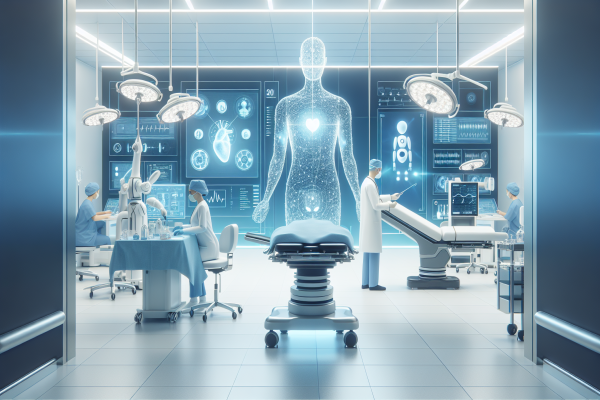
AI's Pioneering Role in Shaping the Future of Healthcare
AI's Pioneering Role in Shaping the Future of Healthcare
Artificial Intelligence (AI) is rapidly transforming various sectors, with healthcare standing out as one of the most promising fields for its application. The integration of AI technologies into healthcare systems is poised to revolutionize how medical services are delivered, enhance patient care, and accelerate medical research. This blog explores AI's evolution in healthcare, its cutting-edge applications, and the future it holds for the industry. This is particularly relevant for healthcare professionals, clinic managers, and medical tech enthusiasts eager to stay ahead in the rapidly evolving landscape.
The Evolution of AI in Healthcare
AI's journey in healthcare has transitioned from theoretical concepts to real-world applications, marking significant milestones along the way. Initially, AI was limited to academic research and theoretical models. However, breakthroughs in machine learning and data analytics have paved the way for AI's practical applications in medicine. Notable achievements include IBM's Watson, which demonstrated AI's potential in diagnosing rare diseases by analyzing vast datasets.
Cutting-Edge AI Applications in Healthcare
AI in Surgery
AI is making waves in surgery by enhancing precision and enabling robotic procedures. The Da Vinci Surgical System, for instance, exemplifies AI's impact on minimally invasive surgeries, offering surgeons enhanced dexterity and precision. This system has significantly reduced recovery times and improved surgical outcomes.
Virtual Health Assistants
AI-powered virtual health assistants are transforming patient engagement and support. The Rashflash AI Chatbot is a prime example, providing patients with instant access to medical advice, appointment scheduling, and personalized health tips, thereby improving patient satisfaction and streamlining clinic operations. To explore innovative AI tools like the Rashflash AI Chatbot, visit Rashflash AI Chatbot.
AI in Drug Discovery
AI algorithms are revolutionizing drug discovery by accelerating the development process. During the COVID-19 pandemic, AI played a crucial role in vaccine development, demonstrating its ability to analyze complex datasets and predict potential drug candidates swiftly. This has significantly reduced the time and cost associated with bringing new drugs to market.
Advantages of AI Implementation in Healthcare
- Enhanced diagnostic accuracy and early disease detection.
- Streamlined administrative processes and reduced operational costs.
- Improved patient outcomes through personalized treatment plans.
Ethical and Regulatory Challenges
Despite its benefits, AI in healthcare raises ethical and regulatory challenges. Data privacy and security are major concerns, as AI systems often require access to sensitive patient information. Additionally, ethical dilemmas arise when AI is involved in life-critical decision-making processes. Navigating these challenges requires robust regulatory frameworks and continuous ethical scrutiny.
The Future of AI in Healthcare
AI's role in telehealth and remote patient monitoring is set to expand, offering new possibilities for healthcare delivery. Emerging trends suggest that AI will redefine healthcare accessibility globally, making quality medical care available to underserved populations. As AI technology evolves, it is expected to further enhance healthcare delivery, making it more efficient and patient-centric.
Success Stories and Real-World Examples
Several hospitals and clinics have successfully implemented AI, resulting in improved efficiency and patient satisfaction. For instance, AI-driven predictive analytics have been instrumental in reducing hospital readmission rates, showcasing AI's potential to streamline healthcare operations and improve patient care outcomes. According to a study published in the Journal of Medical Internet Research, AI applications in healthcare have led to a 30% reduction in hospital readmissions (source: Journal of Medical Internet Research).
Conclusion
AI's transformative impact on the healthcare industry is undeniable. From enhancing diagnostic accuracy to improving patient engagement, AI is reshaping healthcare delivery and research. For healthcare professionals and decision-makers, embracing AI solutions is crucial to staying competitive and providing top-notch care. By exploring AI tools like the Rashflash AI Chatbot, healthcare providers can enhance their practices and deliver better patient outcomes.
To discover more about innovative AI solutions for healthcare, visit Rashflash AI Chatbot.


